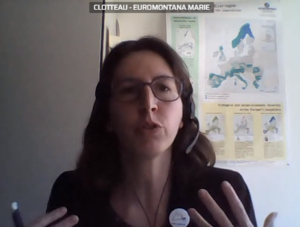On 14 June 2021, the European Committee of the Regions, with the support of Euromontana, the Yolda Initiative and the International Year of Rangelands and Pastoralists (IYRP) Regional Support Group for Europe, held the conference “Pastoralism: a crucial way to tackle sustainability challenges in EU and beyond“.
Maintaining pastoralism is essential for achieving the EU’s environmental, climate and biodiversity protection objectives under the Green Deal, as well as for the territorial cohesion of the Lisbon Treaty. More broadly, pastoralism contributes to several of the United Nations Sustainable Development Goals (SDGs). However, the maintenance of pastoralism faces various threats.
Therefore, the conference gave the floor to European policy makers, representatives of the European Commission and the European Parliament, and pastoralist organisations from Europe and beyond, who identified in the first three round tables the challenges that pastoralism faces but also highlighted its important contributions to the three pillars of sustainability. For example, grasslands can store as much carbon as dense mountain forests, they contribute to preserving biodiversity (like in Spain, where 17 species of community interest depend on pastoralism), provide ecosystem services including food supply and rural vitality.
How to support pastoralism in Europe and worldwide?
Moderated by Marie Clotteau, Director of Euromontana, the last round table of the conference looked at how Europe and the wider international community can better support the maintenance of sustainable pastoral practices.
H.E. Mendsaikhan Zagdjav, Minister of Food, Agriculture and Light Industry of the Government of Mongolia, is behind the initiative to designate 2026 as the International Year of Rangeland and Pastoralists. This proposal is to be adopted by the 42nd session of the FAO Conference in June 2021 and will be submitted to the 76th session of the United Nations General Assembly (UNGA) in September 2021. The Minister stressed that Mongolia is a landlocked country with a harsh climate; food security in Mongolia is largely dependent on food and livestock imports, and agriculture is one of the most important sectors of the Mongolian economy. According to the Minister, the International Year of Rangeland and Pastoralists can help advocate for sustainable management of pastures and contribute to ensuring food security on a global scale. At present, their proposal is already supported by 81 countries around the world.
Rui Martinho, Secretary of State for Agriculture and Rural Development of Portugal, representing the Portuguese Council Presidency, recalled the importance of pastoralism in Europe, where 30% of land is used for pastoral practices. However, he also pointed out that pastoralism is endangered, with a 12% decrease of grazing areas between 1990 and 2003 (with the exception of some countries, such as Portugal, which experienced a 14% increase).
Maria Helena Semedo, Deputy Director-General of FAO, recalled that FAO created the Pastoral Knowledge Hub to provide better data and knowledge on pastoralism and to offer evidence-based solutions. However, Ms Helena Semedo also stressed that more action and coordination is needed to achieve the goals of the UN 2030 Agenda. The Deputy Director-General therefore announced FAO’s intention to improve methodologies and establish a mechanism for interaction with pastoralists. When asked about the most effective way to support the International Year of Rangelands and Pastoralists, Gregorio Juan Velasco Gil, Coordinator of the FAO Pastoral Knowledge Hub, invited the participants to mobilise and reflect on the needs of pastoralists. He argued that 2026 should ultimately be a tool to help farmers, consult local communities and share their recommendations.


In conclusion of this conference, Juanan Gutiérrez, President of Euromontana, invited all stakeholders and participants to continue mobilising to get 2026 designated as the International Year of Rangelands and Pastoralists, as a first step towards working jointly on resilience, climate change, ecosystem services, sustainable livestock production, innovation with all pastoral stakeholders, including youth and women.
Euromontana’s President once again underlined the remarkable contribution of pastoralism to the preservation of biodiversity, landscapes, local cultures, vibrant rural communities but also to the production of quality food products. He therefore called on Member States to implement adequate support mechanisms for pastoralism in the framework of the new Common Agricultural Policy through their CAP Strategic Plans. He also invited the European Commission to adopt a European Action Plan for Pastoralism which, in line with the Long Term Vision for Rural Areas and the Green Deal, should propose concrete measures to support the continuation of the sustainable and extensive practices which are intrinsic to pastoralism.
For more information, you can also consult the press release of the European Committee of the Regions and the presentations from the event.
16 June 2021









